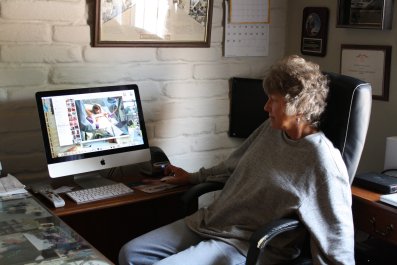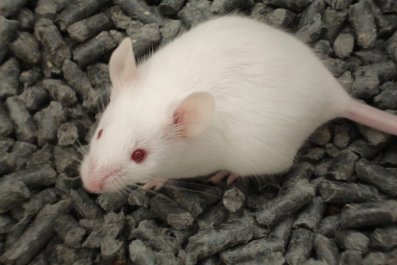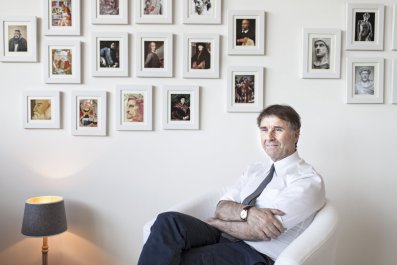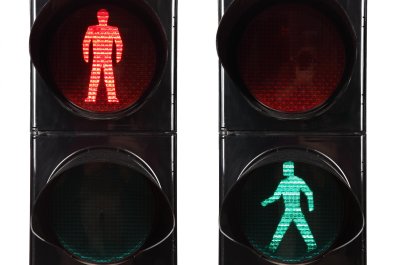The Savages' guide to avoiding the sophomore slump, were it to be inscribed in a gleaming black binder owned by the acclaimed London post-punk band, might look something like this: First, embrace isolation. Spend roughly six months in a studio in London, minimizing human contact and constructing intense, nervy songs about vulnerability and the darker side of love. Then, unleash the songs-in-embryo upon the world by crossing the Atlantic and playing nine shows in poorly ventilated clubs during a particularly cold and bleak New York January. And then, finally, record your album.
A year after attending all nine Savages performances in a feat of endurance and mild winter-borne insanity, I spoke with the group's lead vocalist, Jehnny Beth, a French singer who has honed her underground cred with the duo John & Jehn and the label she co-founded, Pop Noire.
"It's a kind of isolation, in a way," Beth (whose given name is Camille Berthomier) says of the unorthodox process that birthed Savages' new album, Adore Life,due out January 22. "In the idea that it would be a place where only the four of us would meet every day. No one else would get in that place." For the London-based band, the approach has resulted in a startling and powerful set of post-punk tantrums.
Savages has led a rather charmed existence from the start. The group—which is rounded out by Ayse Hassan on bass, Fay Milton on drums and Gemma Thompson on guitar—played its first show just four years ago this month, opening for British Sea Power. Things moved fast; their debut, Silence Yourself, arrived in spring 2013. With its stormy energy, uncanny grasp of post-punk dynamics and intensity through repetition ("Hus-bands! Hus-bands!" Beth shrieks over and over in "Husbands," an especially crowd-charming number), the album was met with rapturous critical acclaim and even a Mercury Prize nomination.
But when the band trekked to New York at the start of 2015, it sought a clean start. "Savages [has] always operated with the live act in mind," Beth says of last year's residency. "We realized we needed the adrenaline that is provided to us by playing the songs live." Plus: "The audiences in America—we saw they like loud music. They have a real culture of that. That fit well."
The group chose small clubs like Mercury Lounge and Saint Vitus Bar, well below the capacity of venues it has headlined in the past. When three shows quickly sold out, they added three more, then three more to that. The experience was a unique one: An onstage proclamation that's commonly dreaded in other performance contexts ("Now we're going to play some new songs") became a cherished opportunity to see Savages work out new material. I began the marathon thinking the group was full of promise. By Show 9, I was convinced Savages is the best young rock band, full-stop.
Dressed in black—and sometimes forgoing lighting altogether—the quartet centered its shows around a stark, brooding ballad called "Adore," which rewards its dark atmospherics with an uncharacteristically hopeful climax: "I adore life / Do you adore life? / I adore life / Do you adore life?" Though not overtly political, Savages' music feels like it's tuned to crisis. One night, Beth dedicated the song to the then-recent Charlie Hebdo attack. On Martin Luther King Day, she spoke of the slain leader.
Beth laughs when asked if there is any sarcasm lurking behind that song's refrain. "No, it's not sarcasm at all," she says. "I think it's a song about vulnerability. I wanted to talk about vulnerability as a strength. Saying something like that is extremely brave, I think, and vulnerable. We thought it was a strength as much as expressing anger."
Adore Life is not a rote retread of Silence Yourself. Though cut from the same goth-punk cloth, full of menacing bass lines and temperamental choruses, the songs zero in on the far extremes of Savages' sound. The terse opener, "The Answer," pits a commanding vocal line ("If you don't love me, don't love anybody!") against a guitar riff that sounds like a lawn mower roaring to life. The final cut, "Mechanics," recalls the slow, groaning textures of Talking Heads' song "The Overload."
Throughout, Beth seems to be preoccupied with nightmarish visions of romantic love. "Love is a disease / The strongest addiction I know," she declares in one track. "This is what you get when you mess with love!" she shouts over and over on the urgent "T.I.W.Y.G." On "Mechanics," her terror turns to curiosity: "I want to learn the touch of love," she sings, "how you could burn with just one touch."
From the songs, you'd think the singer has recently joined Inamorati Anonymous, the fictional, Thomas Pynchon–invented support group that considers love "the worst addiction of all"—or that she's been going on some of the worst Tinder dates ever.
"I tried to be honest about [love]," Beth says. "If I was going to write about love, then I was going to write about the by-products of love as well—the things that we do, the things that we say that we might be ashamed of. I've always been interested in the dark side of things." (That much is obvious, perhaps.)
"If you're experiencing a feeling of love, you're also experiencing probably anxiety or fear of being abandoned or jealousy," the singer adds. "I think they're almost unavoidable."
Beth found inspiration in unexpected corners while writing Adore Life. She found herself listening to grunge-era rock bands—Soundgarden, Pearl Jam, Mad Season—for reasons she can't quite explain. ("I don't know, it was my '90s summer for some reason," she laughs. "I was maybe looking back at when guitar music was a real trend.") And then, in a bookstore in San Francisco, she stumbled upon a copy of the book Crime Against Nature by the writer Minnie Bruce Pratt, who recounts losing custody of her children after coming out as gay.
"I discovered this book and I felt there was an intensity in the necessity for her to write these words, considering her experience [changed] her life completely," Beth says. "I was touched by that story—the fact that she had a very conventional life with her husband and she fell in love with a woman and she decided she had to leave everything behind.
"What interests me is not necessarily the fact that she discovered her sexuality," the singer adds. "It's more the fact that she became a poet and she started writing. The actions in her life triggered inspiration. This whole record, I've realized that afterwards, it's investigating this idea of inspiration."
That proclamation too is free of sarcasm.





















